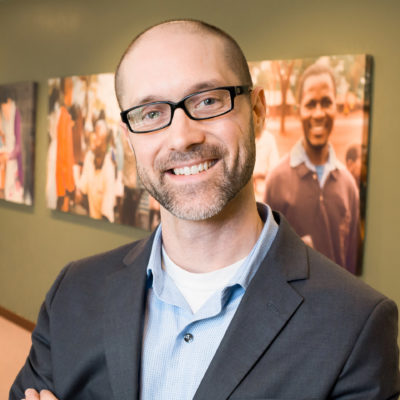
Making Apologetics Part of Youth Ministry’s DNA
Her name was Jennifer. She was the star of the youth group. She was the leader, the role model, the one that both parents and pastor were convinced would be a much-needed light into the dark corners of university life. Naturally, Jennifer was commissioned and sent to the local public university. Everyone was confident that she would no doubt make a difference.
A semester later, the phone call came. “Dad, I am not sure I believe in Jesus anymore.” Without panicking, Jennifer’s dad questioned and probed; searching for the right thing to say to set his perfect daughter back on track. Her biggest reason for turning away from the church and the faith she had known her entire life was courtesy of one professor. She told her dad, "I had a smart professor that said we shouldn't believe in fairy tales if we are going to make it in the world of academia." That was all it took. One professor and one semester to erase 18 years of Sunday school, youth group, prayer, etc.
What was missing? Neither Jennifer, her parents, or pastor saw what was coming. While so many of us wait for a problem to occur, then search for the antibiotic, the solution is in the inoculation. The entire Christian community must work together to prepare our students for what they are guaranteed to experience after high school (or even in high school).
It starts with integrating the practice of apologetics into your youth ministry. But how? There are a few key ways that with very little effort you can expose students to other worldviews, arguments, and objections to Christianity in a controlled environment grounded in biblical truth.
Create A Culture Of Questions
Students have questions. There is no way around it, and there is no way of avoiding it. Nor should you. So it is critical that you can foster a culture where questions are encouraged. But don't freak out just yet. I am not saying that you must have all the answers to every question every student asks. Believe me; they will devise some kind of crazy question that you can’t answer—or even should answer. That isn’t the point. The point here is to make certain that students feel safe to ask and wrestle with huge questions.
Although it might be hard to imagine, there are many students who have been raised to believe that to doubt and question is to have insufficient faith. Think about John the Baptist for a moment. He sat in jail wondering if Jesus really was the Messiah, or had he made a mistake? So did he have insufficient faith? The key here is to look at the response Jesus gives to John’s disciples to be delivered back to John. He does not rebuke, express disappointment, or laugh in their faces. Jesus simply responded with evidence.
“So he replied to the messengers, “Go back and report to John what you have seen and heard: The blind receive sight, the lame walk, those who have leprosy are cleansed, the deaf hear, the dead are raised, and the good news is proclaimed to the poor. Blessed is anyone who does not stumble on account of me.” - Luke 7:22-23
Jesus rattles off several pieces of evidence that, in Jesus, the kingdom was coming indeed. He essentially gave John exactly what he needed to hear. Questions and doubts can be incredibly productive when it leads to answers and certainty. Create a culture that encourages students to ask the tough questions and then explore answers together.
Put Students in The Hot Seat
Creating the right culture is a great start, but students need to experience real life conditions. When soldiers go into boot camp, they don’t merely sit inside a classroom asking their commander questions. Instead, the vast majority of their training is experiencing battle-like conditions in a simulated environment. I often think of high school ministry the same way, by giving students simulated experiences based on what they will encounter in the world beyond the safety of their Christian world.
I call it the Hot Seat. What usually started off, as terrifying for some students quickly became one of the most popular days in many of my classes as a teacher. And surprisingly it works just as well in a youth group setting. Essentially this is a role-playing exercise designed to engage other worldviews. You can do this in two ways.
First, bring in a stranger. Have them play the role of another worldview and present their case to your students. Make sure they are well educated and can answer a few objections. Let the students ask the questions after the presentation. Be sure to spend time debriefing with your students. This is where some of the best lessons are learned. Think about everything with them. From what they heard in the presentation, what sounded good to what was inconsistent. How did they respond? How should they have responded? This is also a good time to teach love and respect when speaking with a person of a different worldview.
Second, change this scenario up a little by doing a one-on-one. I usually did this on stage with either two students—one playing the role of Christian and the other another worldview. Or I would ask for a student volunteer to ask me a series of questions, and I would play the role of another worldview. For this one, you will want a predetermined series of questions and a confident student. However, this option is not necessarily designed to benefit the student volunteer. It is designed to instruct the rest of the group. Be sure to get them involved. Again, debrief. Think about both sides of the argument and the demeanor of each. If necessary, stop in the middle of the exercise to teach or redirect.
But I cannot stress this enough. You must spend time debriefing with students. Only do what your students are ready for and be ready for questions, comments, and concerns. Remember, it is better to expose students to other worldviews in a controlled environment to better prepare them for the real deal.
Call In the Experts
Have you ever heard of the 50-mile rule? A friend and former colleague of mine introduced me to this a number of years ago. Think of it this way: You have a group of students that you are speaking to, mentoring, etc. and provide them with some amazing truths from Scripture. Its reception is only lukewarm. But some time later, maybe at a retreat or conference, another speaker who traveled in from another state or part of the country says the same thing and the students act like they have never heard it before and the truth blows their minds. This is the 50-mile rule. The further away a person lives, the more authority they seem to have. Sometimes if you want to drive home a point in the hearts and minds of your students, you have to bring in a guest speaker. One who is not local and who has some authority on the subject.
This does a couple of key things for you as a youth leader. First, it takes the pressure off of you. If apologetics is not your thing and you don't feel confident in discussing it at great length and depth with your students, then you will naturally shy away from it. Unless of course, you decide to read a dozen books on the subject. But truthfully, who has time for that? Second, it can reinforce what you have been teaching. It was like when we were kids. If mom tells us something we would rather not believe, then we ask dad. If we still refuse to believe it, then we ask our friend's mom. Or better yet, a celebrity reinforces what mom was saying all along. Only then do we concede.
However, don’t just go for the most popular speaker money can buy. Take some time to figure out what your students need. What questions do they have? What are they most struggling with? What kind of speaker do they need? There is a huge variety of topics, backgrounds, and styles available. Be aware of what and who your students will respond to. Not sure where to start? Contact the AwanaYM team, and we can help point you in the right direction.
Use Curriculum and Eliminate the Guess Work
Finally, if you are looking to dive much deeper into apologetics then I would suggest committing an entire year to the task. I would take a systematic approach and consider investing in some quality curriculum that will help you guide your students through some difficult concepts. Apologetics is not an easy study and not a topic to be taken lightly. Using a well-organized curriculum can be a huge advantage. Which is precisely why AwanaYM teamed up with Sean McDowell to create Advocates .
We recognized the incredible void in curriculum designed around youth apologetics yet the deep need to train students to engage their culture with truth in humble dialogue. Advocates provides youth leaders—bi-vocational, full-time, or part-time—with a comprehensive suite of tools that will train students to always be prepared (1 Peter 3:15), take every thought captive (2 Corinthians 10:5), defend the truth with sound doctrine (Jude 3), and speak truth in love (Ephesians 4:15). It is far more than simply worldviews or world religions training; its truth training. It is learning to live the Christian worldview in a world that has categorically rejected it.
Ask yourself how Jennifer’s story might have turned out had she been prepared for her professor’s worldview. When I began this week's blog, I had almost 10 different ideas, and am sure I could come up with twenty or more. These are just a few of my favorites. The point is, is that you engage your students in some fashion to apologetic topics, arguments from skeptics, or other worldviews. Create an environment where they can ask questions, make mistakes, raise doubts, and come to conclusions that appropriately reflect biblical truth. We live in a world that is far too dangerous to sit back and do nothing, hoping that a weekly sermon, worship music, and maybe a retreat or two is enough. It’s not. Doing nothing is no longer an option.
My challenge to you is this: pick just one of these ideas and run with it. Watch how your students respond. Stick with it, and you’ll see seniors graduating with greater confidence and making a greater impact on the world than you imagined they would.
Steve Kozak
Executive Director of AwanaYM
Steve currently serves as the Executive Director of AwanaYM. Previously, Steve spent over a decade teaching high school theology and apologetics from Detroit to LA. Steve holds a Masters degree in Theology from Moody Theological Seminary and a Masters in Christian Apologetics from Biola University. Steve is also an adjunct professor at Trinity International University. He speaks and writes on youth ministry, youth culture and apologetics. He resides in Chicago, IL with his wife and four children.FollowSteve Kozak on Twitter: stevenmkozak
Comments
Get the AwanaYM Update
Receive youth ministry resources in your inbox. Subscribe today!
